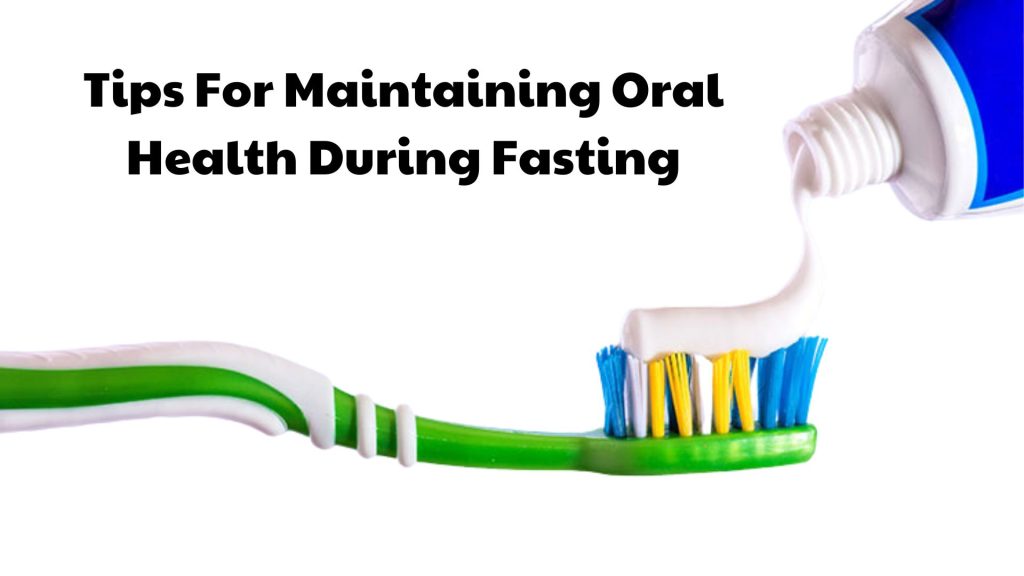Can you brush your teeth while fasting? While fasting, you may and should still wash your teeth. In this post, we’ll find out whether and how brushing your teeth impacts your fasting condition, as well as any special considerations you should make. The information should help you maintain good dental health throughout your fast.
Can You Brush Your Teeth While Fasting?


We all know that preserving dental health is essential in our lives. However, one often-asked issue is whether it is feasible to wash your teeth while fasting. Yes, you can clean your teeth entirely while fasting.
In truth, cleaning your teeth is typically not considered a breach of fasting regulations. Dental care is an essential element of overall health and should not be overlooked under any circumstances. During adoration or stringent religious fasts, teeth brushing may be different.
In this circumstance, please seek the guidance of a professional or your religious leader. Brushing is crucial for dental health and does not interfere with fasting.
Important Oral Care When Fasting
Fasting dental care is essential not just for oral health but also for general well-being. It is extremely vital to take care of your teeth and gums at this time when you aren’t eating.
First, fasting reduces tooth fiber and nutrition, raising plaque and tooth decay risk. Brushing and flossing while fasting removes plaque and maintains tooth health.
Second, keeping the tongue fresh helps manage to breathe when fasting. Oral hygiene reduces foul breath and improves everyday comfort. Proper dental hygiene also prevents tooth enamel damage. To preserve dental enamel, use alcohol-free or natural mouthwashes.
Finally, dental care while fasting is beneficial to oral, general, and fasting health.
Rules For Brushing Teeth When Fasting


Maintaining good oral hygiene is crucial at any time of day, but especially during fasting. Indeed, dental hygiene is an integral part of daily life that must never be neglected.
However, there are a few rules to follow to ensure that brushing won’t impede the process whether you’re fasting or not. Brushing up on your oral health is a great way to maintain your overall health:
Using Proper Dental Products
The first, and most important step in dental hygiene when fasting is selecting the appropriate materials. Before buying a new toothbrush or toothpaste, it is important to examine the label to verify what components are contained.
Choose a toothbrush with extra-soft bristles to avoid irritating your gums. Small brushes with tiny heads can swiftly reach hard-to-reach places. It’s better to pick toothpaste without strong odors. You may not want to consume strong flavors while fasting or till later.
If you want to use goods that don’t harm the environment, one option is to switch to natural or organic toothpaste.
Gentle Toothbrushing While Fasting
Cleaning your teeth carefully when fasting is vital. This helps preserve oral health and guarantees that your dental care regimen doesn’t interfere with your fasting. We should use a toothbrush with soft bristles to clean our teeth gently and avoid gum and mouth damage. Draw lines on teeth without pressure using gentle motions.
Fasting might make gums more sensitive, so this is crucial. Brush your teeth thoroughly, paying attention to each region of your teeth and gums. Gently removing plaque and food without pressure is possible.
Tooth Brushing Time
If you are fasting for religious reasons as well as for health reasons, you should give careful thought to the timing of your dental hygiene practice. Some recommended times for dental hygiene are as follows:
It’s essential to clean your teeth after your big meal, whether it’s nutritional or religious. You may maintain good dental health by doing this after each meal. For reasons of personal hygiene and religious observance, however, you may find it preferable to wash your teeth at different times of the day.
You may choose to wash your teeth first thing in the morning when you get up or the last thing at night before you go to sleep. Even if you’re fasting, you may eliminate food from your teeth by lightly brushing after eating snacks throughout the day. To do this, clean your teeth softly with a soft toothbrush. When you should wash your teeth is ultimately up to you, your schedule, and your religious beliefs.
Minimize Alcohol-Based Mouthwash
There may be good reasons to limit the use of mouthwashes with alcohol while on a religious or food fast. There are various reasons to think about this.
First, mouthwash with alcohol may break a fast because alcohol is absorbed via the mouth and digestive system. This may have an impact on the efficacy of the fasting procedure.
Also, mouthwashes with alcohol usually have a strong boozy smell or taste, which can make you hungry or change your appetite, which is not good if you’re trying to control how much you eat Dry mouth with alcohol-based mouthwash may promote gingivitis and tooth decay. Because saliva is no longer sufficient to eliminate acids and germs in the mouth, dry mouth raises the risk of tooth decay.
Tips For Maintaining Oral Health During Fasting


Fasting oral health requires several vital recommendations.
At first, it’s crucial to brush your teeth twice a day. To prevent plaque, brush your teeth twice a day using a soft toothbrush and fluoride toothpaste. Try to wash your teeth from top to bottom and chill them.
Every day, use dental floss to get rid of bacteria and food that is stuck between your teeth. Limit your intake of sour and sweet foods to keep your teeth’ enamel from wearing away and to make bacteria-friendly conditions. Drinking enough water keeps the mouth fresh and removes food particles from teeth.
Furthermore, it is important to visit your doctor regularly for checkups. This detects and treats dental issues quickly. Keep your mouth healthy and avoid breaking your fast with alcohol-free mouthwash.
Finally, if you take a small meal throughout the day, clean your teeth lightly afterward to eliminate food without disrupting your fast. These suggestions can help you keep your tongue healthy throughout your fast.
How To Protect Teeth While Fasting?
There are many ways to safeguard your dental health when fasting. Start with everyday dental hygiene. Specifically, it means using a soft toothbrush and fluoride toothpaste at least twice daily to remove plaque and keep teeth clean. Avoid erosion of tooth enamel and the creation of bacteria-friendly circumstances by limiting your intake of sour and sugary meals and using dental floss regularly to remove plaque and food lodged between teeth.
After eating, wait 30 minutes before brushing to protect dental enamel. Drinking enough water keeps the mouth fresh and eliminates food particles from teeth. Keep your teeth clean and healthy with frequent dentist visits.
When choosing a dental practice for your oral health, consider Spring Orchid Dental. There are several services and dental care advice for vegetarians at this clinic. Their reliable oral health methods help you preserve healthy teeth and confidence. Additionally, Spring Orchid Dental Clinic offers monthly dental checkups to keep your teeth healthy. They respect diverse diets and help vegetarians maintain excellent dental health.
For expert dental health treatment, choose Spring Orchid Dental Clinic!
FAQs
Is Colgate Vegan And Cruelty-Free?
Yes, it is. It is not their policy to hurt animals, and they have made a number of veggie goods. The anchor text Colgate Zero for Kids Toothpaste line is one of the brands that offer “vegan” and “cruelty-free” goods. The same cannot be said for all Colgate products; some may have ingredients that aren’t vegan or don’t avoid using animal testing.
Check out Colgate’s website or call them directly for help and proof to get more information about their vegan and cruelty-free goods. believe. Colgate’s website gives thorough information on these items to assist customers in choosing.
Does Brushing Your Teeth Break Fasting Ketosis?
No, it isn’t. Most dietitians feel that routine teeth brushing has no effect on the ketosis state during fasting. Reason:
- Ketosis occurs when the body utilizes fat as its primary source of energy rather than carbs. Brushing your teeth does not give enough carbs or raise blood sugar levels to cause ketosis.
- The majority of toothpastes do not include sugar or carbs. Brushing your teeth with normal toothpaste has no effect on ketosis.
- Even if just a tiny quantity of toothpaste is taken, the amount of carbs in it is extremely minimal, and not enough to cause the body to exit ketosis.
- According to several research, cleaning one’s teeth has no effect on blood ketone levels in fasting persons.
As a result, you may clean your teeth regularly while fasting without the risk of disrupting your ketosis condition. It is important to brush with sugar-free toothpaste and avoid swallowing mouthwash after brushing.
What Toothpaste Should You Use When Fasting?
Choose a sugar-free toothpaste if you’re fasting so you don’t have to worry about accidentally breaking your fast. Here are a few good choices for toothpaste:
- There is no fluoride, no alcohol, and no scent in this toothpaste, so it won’t irritate your mouth.
- Toothpaste includes xylitol instead of sugar – xylitol has no calories and does not raise blood sugar.
- The fluoride in gel toothpaste is a great way to keep your teeth healthy.
- This baking soda-free toothpaste is designed to clean softly without harming tooth enamel.
- To prevent any unnecessary discomfort, children’s toothpaste often has a mild taste.
Toothpastes that include alcohol, or flavorings, or provide a cold sensation while brushing your teeth should be avoided since they may increase stomach acid production. In the event of dental distress, see a medical professional immediately.





